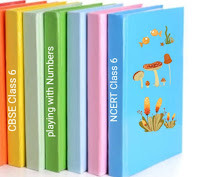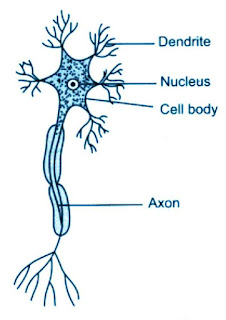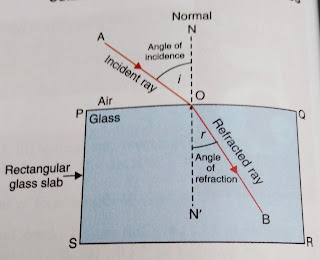NCERT Solution for Class 6 Maths Chapter 3 Playing with Numbers Ex 3.3
Playing with Numbers: Here you get NCERT Solutions for Class 6 Maths Chapter 3 Playing with Numbers Ex 3.3 with Answers Pdf free download.In NCERT Solution Class 6 Maths with Answers you get question-answer based on latest exam pattern. By providing NCERT Chapter-wise Class 6 Maths Questions with Answers our target to help students get concept of the lesson very well.
You can also visit NCERT Questions for Class 6 Maths Chapter-wise Questions with Answers to revise your syllabus thoroughly and enhance the chances of securing high marks in your board exams. It also helps in your CBSE NCERT Class 6 online test, online exam for admission well.
-------------------------------------------------------------
Board CBSE
-------------------------------------------------------------
TextBook NCERT
-------------------------------------------------------
CLASS Class 6
--------------------------------------------------------
SUBJECT Maths
----------------------------------------------------------
CHAPTER Chapter 3
-------------------------------------------------------------
SUBJECT Playing with Numbers
--------------------------------------------------------------
Visit NCERT Solutions
-------------------------------------------------------------------
NCERT Class 6 Chapter 3 Ex 3.1
NCERT Class 6 Chapter 3 Ex 3.2
NCERT Class 6 Chapter 3 Ex 3.4
NCERT Class 6 Chapter 3 Ex 3.5
NCERT Class 6 Chapter 3 Ex 3.6
NCERT Class 6 Chapter 3 Ex 3.7
You May Like
NCERT Solutions Class 6 Science
NCERT Solutions for Class 6 Maths Chapter 3 Playing with Numbers Ex 3.3 with Answers
Exercise 3.3
Question 1:
Using divisibility test, determine which of the following numbers are divisible by 2; by 3; by 4; by 5; by 6; by 8; by 9; by 10; by 11. (Say yes or no)
Answer 1:
Question 2:
Using divisibility test, determine which of the following numbers are divisible by 4; by 8:
(a) 572 (b) 726352 (c) 5500 (d) 6000
(e) 12159 (f) 14560 (g) 21084 (h) 31795072 (i) 1700 (j) 2150
Answer 2:
(a) 572
Divisible by 4 because its last two digits are divisible by 4.
Not divisible by 8 because its last three digits are not divisible by 8.
(b) 726352
Divisible by 4 because its last two digits are divisible by 4.
Divisible by 8 because its last three digits are divisible by 8.
(c) 5500
Divisible by 4 because its last two digits are divisible by 4.
Not divisible by 8 because its last three digits are not divisible by 8.
(d) 6000
Divisible by 4 because its last two digits are 0.
Divisible by 8 because its last three digits are 0.
(e) 12159
Not divisible by 4 because its last two digits are not divisible by 4.
Not divisible by 8 because its last three digits are not divisible by 8.
(f) 14560
Divisible by 4 because its last two digits are divisible by 4.
Divisible by 8 because its last three digits are divisible by 8.
(g) 21084
Divisible by 4 because its last two digits are divisible by 4.
Not divisible by 8 because its last three digits are not divisible by 8.
(h) 31795072
Divisible by 4 because its last two digits are divisible by 4.
Divisible by 8 because its last three digits are divisible by 8.
(i) 1700
Divisible by 4 because its last two digits are 0.
Not divisible by 8 because its last three digits are not divisible by 8.
(j) 5500
Not divisible by 4 because its last two digits are not divisible by 4.
Not divisible by 8 because its last three digits are not divisible by 8.
NCERT Solutions for Class 6 Maths Chapter 3 Playing with Numbers Ex 3.3 with Answers
Question 3:
Using divisibility test, determine which of the following numbers are divisible by 6:
(a) 297144 (b) 1258 (c) 4335 (d) 61233
(e) 901352 (f) 438750 (g) 1790184 (h) 12583(i) 639210 (j) 17852
Answer 3:
(a) 297144
Divisible by 2 because its units place is an even number and also divisible by 3 because the sum of its digits (= 27) is divisible by 3.
Since the number is divisible by both 2 and 3, therefore, it is also divisible by 6.
(b) 1258
Divisible by 2 because its units place is an even number but not divisible by 3 because the sum of its digits (= 16) is not divisible by 3.
Since the number is not divisible by both 2 and 3, therefore, it is not divisible by 6.
(c) 4335
Not divisible by 2 because its units place is not an even number bit the given number is divisible by 3 because the sum of its digits (= 15) is divisible by 3.
Since the number is not divisible by both 2 and 3, therefore, it is not divisible by 6.
(d) 61233
The given number is not divisible by 2 because its units place is not an even number but the given number is divisible by 3 because the sum of its digits (= 15) is divisible by 3.
Since the number is not divisible by both 2 and 3, therefore, it is not divisible by 6.
(e) 901352
The given number is divisible by 2 because its units place is an even number but the given number is not divisible by 3 because the sum of its digits (= 20) is not divisible by 3.
Since the number is not divisible by both 2 and 3, therefore, it is not divisible by 6.
(f) 438750
The given number is divisible by 2 because its units place is an even number but the given number is divisible by 3 because the sum of its digits (= 27) is not divisible by 3.
Since the number is divisible by both 2 and 3, therefore, it is divisible by 6.
(g) 1790184
The given number is divisible by 2 because its units place is an even number but the given number is divisible by 3 because the sum of its digits (= 30) is not divisible by 3.
Since the number is divisible by both 2 and 3, therefore, it is divisible by 6.
(h) 12583
The given number is not divisible by 2 because its units place is not an even number but the given number is not divisible by 3 because the sum of its digits (= 19) is not divisible by 3.
Since the number is not divisible by both 2 and 3, therefore, it is not divisible by 6.
(i) 639210
The given number is divisible by 2 because its units place is an even number but the given number is divisible by 3 because the sum of its digits (= 21) is not divisible by 3.
Since the number is divisible by both 2 and 3, therefore, it is divisible by 6.
(j) 17852
The given number is divisible by 2 because its units place is an even number; the given number is not divisible by 3 because the sum of its digits (= 23) is not divisible by 3.
Since the number is not divisible by both 2 and 3, therefore, it is not divisible by 6.
NCERT Solutions for Class 6 Maths Chapter 3 Playing with Numbers Ex 3.3 with Answers
Question 4:
Using divisibility test, determine which of the following numbers are divisible by 11:
(a) 5445 (b) 10824 (c) 7138965 (d) 70169308 (e) 10000001 (f) 901153
Answer 4:
(a) 5445
Sum of the digits at odd places = 4 + 5 = 9
Sum of the digits at even places = 4 + 5 = 9
Difference of both sums = 9 – 9 = 0
Since the difference is 0, therefore, the number is divisible by 11.
(b) 10824
Sum of the digits at odd places = 4 + 8 +1 = 13
Sum of the digits at even places = 2 + 0 = 2
Difference of both sums = 13 – 2 = 11
Since the difference is 11, therefore, the number is divisible by 11.
(c) 7138965
Sum of the digits at odd places = 5 + 9 + 3 + 7 = 24
Sum of the digits at even places = 6 + 8 + 1 = 15
Difference of both sums = 24 – 15 = 9
Since the difference is neither 0 nor 11, therefore, the number is not divisible by 11.
(d) 70169308
Sum of the digits at odd places = 8 + 3 + 6 + 0 = 17
Sum of the digits at even places = 0 + 9 + 1 + 7 = 17
Difference of both sums = 17 – 17 = 0
Since the difference is 0, therefore, the number is divisible by 11.
(e) 10000001
Sum of the digits at odd places = 1 + 0 + 0 + 0 = 1
Sum of the digits at even places = 0 + 0 + 0 + 1 = 1
Difference of both sums = 1 – 1 = 0
Since the difference is 0, therefore, the number is divisible by 11.
(f) 901153
Sum of the digits at odd places = 3 + 1 + 0 = 4
Sum of the digits at even places = 5 + 1 + 9 = 15
Difference of both sums = 15 – 4 = 11
Since the difference is 11, therefore, the number is divisible by 11.
Question 5:
Write the smallest digit and the largest digit in the blanks space of each of the following numbers so that the number formed is divisible by 3:
(a) __________ 6724 (b) 4765 __________ 2
Answer 5:
(a) 6+7+2+4 =19
We know that a number is divisible by 3 if the sum of all digits is divisible by 3.
Therefore, Smallest digit : 2
26724 = 2 + 6 + 7 + 2 + 4 = 21
Largest digit Will be : 8
86724 = 8 + 6 + 7 + 2 + 4 = 27
(b)4+7+6+5+2=24
We know that a number is divisible by 3 if the sum of all digits is divisible by 3.
Therefore, Smallest digit : 0
476502 = 4 + 7 + 6 + 5 + 0 + 2 = 24
Largest digit : 9
476592 = 4 + 7 + 6 + 5 + 9 + 2 = 33
Question 6:
Write the smallest digit and the largest digit in the blanks space of each of the following numbers so that the number formed is divisible by 11:
(a) 92 __________ 389 (b) 8 __________ 9484
Answer 6:
sum of odd place disit: 9+8=17
sum of even place digits : 2+3+9=14
We know that a number is divisible by 11 if the difference of the sum of the digits
at odd places and that of even places should be either 0 or 11.
Therefore the smallest or largest digit is 8
Therefore, the number is 928389
Odd places = 9 + 8 + 8 = 25
Even places = 2 + 3 + 9 = 14
Difference = 25 – 14 = 11
(b) sum of odd place disit:8+9+8=25
sum of even place digits :4+4=8
We know that a number is divisible by 11 if the difference of the sum of the digits
at odd places and that of even places should be either 0 or 11.
Therefore the smallest or largest digit is 6
Therefore, the number is 869484
Odd places = 8 + 9 + 8 = 25
Even places = 6 + 4 + 4 = 14
Difference = 25 – 14 = 11
NCERT Solutions for Class 6 Maths Chapter 3 Playing with Numbers Ex 3.3 with Answers


